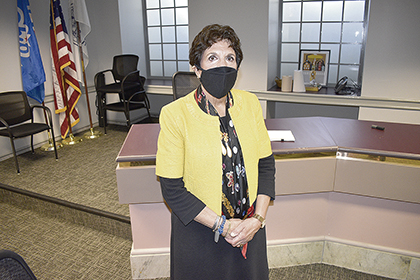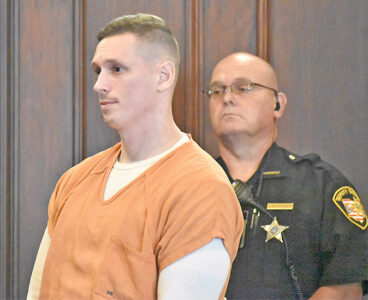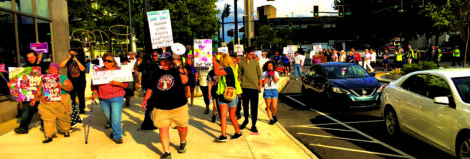Consequences of COVID-19
Attorney and commissioner speak from experience

Mahoning County Commissioner Carol Rimedio Righetti stands in the commissioners meeting room in the basement of the county courthouse. She had a mild case of COVID-19 unlike her husband and brother, which led her to be an evangelist of sorts for safe COVID-19 practices.
YOUNGSTOWN — Over the months since COVID-19 hit, most of us have come to know someone who has had the virus. But what has life been like in the months after they’ve recovered?
Have aftereffects lingered?
Two Mahoning County residents — attorney J.P. Laczko and county Commissioner Carol Rimedio Righetti — have had more than their fair share of experience with the virus. And, they say, COVID-19 has refused to leave.
Laczko, his wife and his parents contracted the virus in the spring. His father, John J. Laczko, 85, died from it April 5.
J.P. Laczko, of Struthers, was never hospitalized and returned to work after his 14-day quarantine ended, but side effects have lingered.
Rimedio Righetti, her husband, Frank, and her brother, Bob, all survived the virus, which struck them early on. Seeing the virus up close has put the commissioner on a mission — to educate and remind people to stay safe and avoid the lasting consequences her husband and brother have faced.
Laczko said recovering from COVID-19 has been comparable to the pneumonia he had more than 15 years ago.
“Five months later, I still have a few residual effects of COVID,” he said. “It kind of centralized itself in my lungs.”
STAMINA
Laczko is a private-practice attorney. He also is director of the Portage County office of the Ohio Public Defender, which requires him to drive to Ravenna most days.
“I’ve always been one of those guys who runs around like crazy,” he said. But after recovering from the virus, he did not have the same stamina and still does not.
“I can’t work as many hours as I used to. Obviously, rest is a little more important. Anything that gets my heart rate up — walking, doing yard work, exercising. I have to take it slow.”
Laczko, his wife and parents had the virus in April, though they did not give it to each other.
“I had a slight fever. Mine settled in my lungs. It felt like somebody poured concrete in my lungs,” he said of the virus. “It was like having pneumonia. You get up, you walk from your bedroom to your kitchen, and you have to sit down because you just have no energy. You sleep a lot. I put on a bunch of weight, too. And that could be because it’s hard to exercise and do stuff.”
He returned to work as soon as his quarantine was over, but he was not 100 percent.
“It took me a while to get back to normal,” he said. It was especially difficult when the weather was hot in summer. “I didn’t lose any sense of taste, smell, anything like that. I only had a fever for like one or two days. I had a horrible cough.
“You don’t go from laying around in bed to working 10-12 hours a day like I do on a normal basis,” he said. “That was kind of tough.”
He said the type of activity that causes him the most trouble is anything with a great deal of exertion, such as taking a long walk.
STILL CONCERNED
Laczko said having had COVID-19 in some ways makes him less fearful of it than some others. Still, Laczko and his wife do not go out to eat as much as they did before the virus.
“I’m still concerned because I have three kids at home. I don’t want to bring it home to them,” he said. “I’m careful and cautious, but I’m not hyper-sensitive to it. I wear a mask, wash my hands, all of those things.
“I’ve had it. I’ve been through it. Hopefully I won’t get it again,” he said.
“It’s real,” he said of the virus. “I will say that. Anybody who feels it doesn’t exist, they’re mistaken. It’s definitely something to be concerned about, especially with elderly people. It’s what my dad died from,” he said.
His mother, Evelyn, died of a stroke about two months after recovering from the virus. It’s not known whether the virus had anything to do with her death.
Dr. James Kravec, medical director of Mahoning County Public Health and chief clinical officer of Mercy Health Youngstown, said it’s important to know that the majority of people that have COVID-19 “have minor symptoms or no symptoms to begin with, but those who do have symptoms and are hospitalized do recover.
“But what we’ve noticed, though, is that there is a constellation of symptoms that some people who have had COVID will have for a prolonged period of time. They call it the ‘long-hauler syndrome.’ The most common symptoms are fatigue, cough, shortness of breath, headache and joint pain.
“Those are the most common, and they can linger for weeks, months or longer.” The medical community also now believes some people who have had COVID are susceptible to heart-muscle weakening, “putting them at increased risk for heart failure or other heart complications in the future.”
Kravec said it’s known that “pneumonia associated with COVID can cause scarring in the lungs, which can cause long-term breathing problems. We know that even in young people, COVID can cause strokes, seizures.”
There is also Gyllian-Barre syndrome, which puts people at risk for future neurological issues, possibly Parkinson’s disease and Alzheimer’s disease, Kravec said.
“We know that there is a risk of something the called COVID fog,” Kravec said. It entails mood disorders and fatigue disorders following COVID. “And then there are blood clots and blood vessel diseases — stroke, heart attack, other weakening of blood vessels. It could affect the kidney and liver as well — that could happen to some people.”
Kravec said the fatigue Laczko mentioned is one of the more common after-effects. “It’s mental fatigue. There’s confusion for some patients. There is physical fatigue. You can’t work as hard. You can’t stay awake as long during in the day. There is increased anxiety that can happen. Some patients have post traumatic stress disorder.”
FAMILY CASES
The story of Rimedio Righetti and her family has similarities to that of Laczko. The family contracted the virus around the same time, and a similar number of her family members experienced it.
Her brother, Bob Rimedio, 69, of Boardman, had the worst case, spending 81 days in the hospital, 51 of those on a ventilator. Her husband, Frank Righetti, 82, spent 2 1/2 weeks in the hospital, seven of those on a ventilator; and Carol, 68, had a mild case.
Carol said her husband and brother continue to experience fatigue months after their recovery.
“Tired, feel exhausted at the end of the day,” Carol said of the continued after-effects of the virus. “Sometimes you might have shortness of breath.”
“You’re tired. You lose hair. Your sense of smell goes, your taste goes,” she said of after-effects she has experienced or seen in her husband and brother. Carol said she lost her sense of smell. “I can’t smell, but hopefully down the road it will come back.”
Based on conversations with doctors, she believes it will be a year or more after the initial recovery before her husband and brother fully recover.
“My brother had it worse than all of us. They both do therapy for their lungs and physical therapy,” she said.
“Once you have this, no matter how severe it is, you have after effects,” she said. “You’re tired. You have muscle aches. All of us who have had it, you just feel exhausted,” she said.
In the months since Carol returned to the weekly county commissioners meetings, she has become an evangelist for safe COVID-19 practices.
“Wear a mask, social distance, carry hand sanitizer,” she reminds everyone, including those watching or participating in the meetings on social media.
“I’m sure people are getting sick of me saying this after every meeting, but I am so adamant about this. Just because you feel it’s over, it’s not over,” she said.
She tries to avoid going into stores but admits she once approached a young woman and child in a store and advised them they should be wearing a mask. The woman did not reply to Carol’s words, but she did get masks from the store and put them on, she said.
Carol said she feels the commissioners are setting a positive example for the community by offering COVID-19 tests to their employees and spouses.
She said she thinks the impact of having 1,700 county employees being diligent in getting tested if they exhibit symptoms could have a positive effect on the county as a whole. “We are doing the right thing,” she said.
“We just need to make sure that our people are healthy,” she said. “I’m going to take the test again. Do what the doctors say. Don’t listen to the political,” she said.
Kravec noted that anyone on a ventilator for a long time — even if they do not have COVID-19 — “is going to have problems,” including possibly post traumatic stress disorder.
“If you imagine what the experience is like for someone in a COVID unit — “no visitors, everyone is all dressed up in the PPE. It might be scary to patients.”




